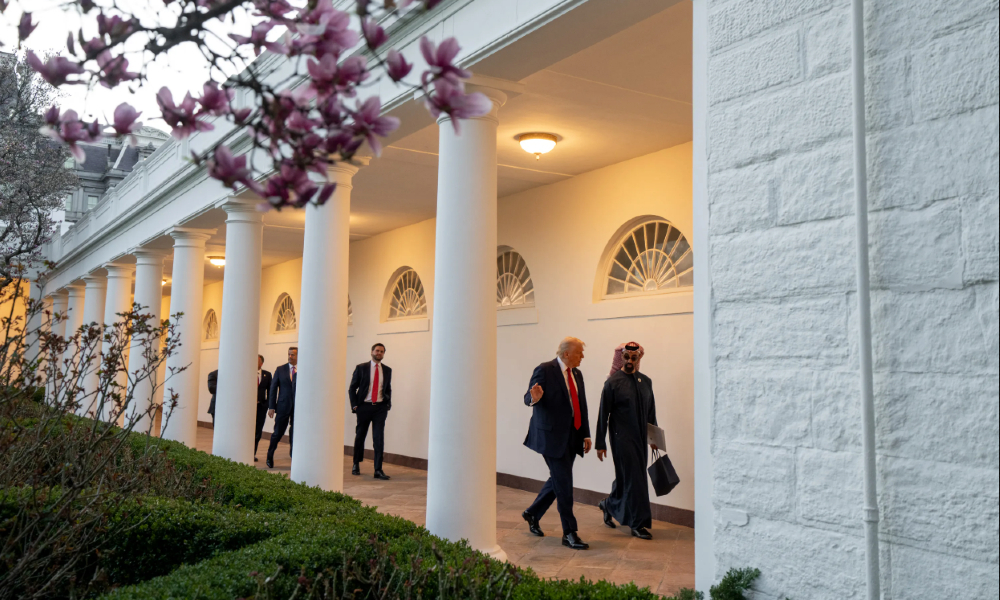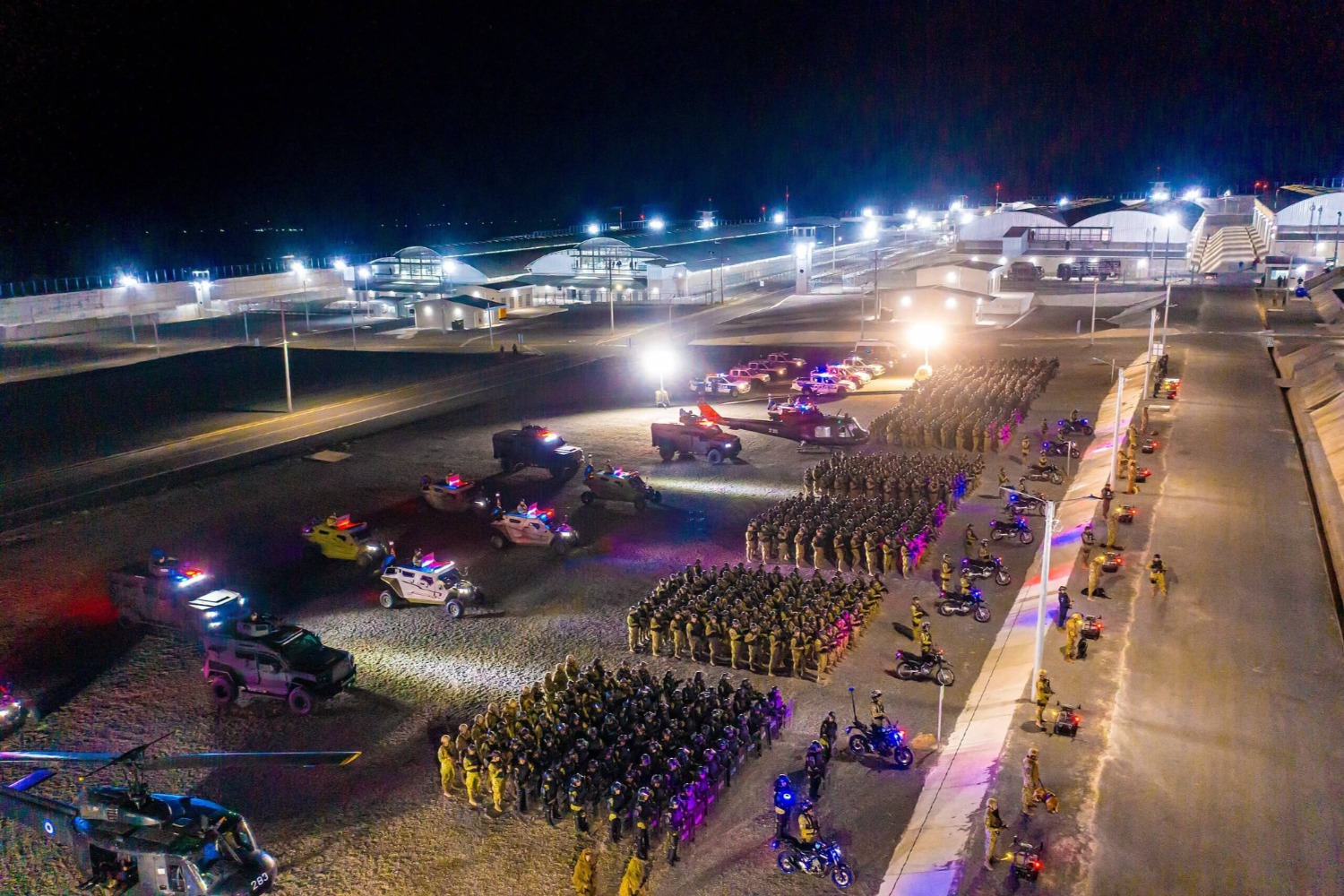The UAE’s Trump-Era AI Strategy

Published by The Lawfare Institute
in Cooperation With

Editor’s Note: The Biden administration sought to reduce China’s power by limiting its access to advanced computer chips and also limiting sales to countries that might transfer these chips. This has frustrated countries like the United Arab Emirates, which seek to become AI powerhouses and acquire many advanced chips from the United States. My Center for Strategic and International Studies colleague Georgia Adamson argues that, despite Abu Dhabi’s protestations that it will not transfer advanced chips to China, the Trump administration should proceed with caution on any chip transfers given the UAE’s extensive ties to Beijing.
Daniel Byman
***
On March 18, United Arab Emirates (UAE) National Security Adviser Tahnoon bin Zayed Al Nahyan dined with U.S. President Trump and top-level Trump administration officials following two days of meetings in Washington. A top priority for the Emirati adviser’s trip: expanding UAE access to U.S. artificial intelligence (AI) chips.
Then came a check. On March 21, the White House announced that the UAE will invest a staggering $1.4 trillion in U.S. AI infrastructure, semiconductors, energy, and manufacturing over the next decade. According to U.S. government sources, the announcement was a direct result of the meeting between Al Nahyan and Trump earlier that week and underscores “the close ties” between the two countries, including in AI.
The investment marks the UAE’s biggest bet on AI thus far as it seeks to become a global technological leader and to diversify its oil-based economy. Though total Emirati spending on AI is not public, the figure is likely already in the hundreds of billions of dollars. In January, Trump revealed that Abu Dhabi AI investment firm MGX would be one of four initial equity partners for a $500 billion bid to build AI infrastructure for OpenAI in the United States. The partnership follows a $100 billion AI investment deal between MGX and several U.S. companies announced in September 2024, as well as a $1.5 billion partnership between Microsoft and Emirati AI national champion G42 announced earlier, in April 2024. For now, the conditions of the $1.4 trillion Emirati investment pledge are unclear, including whether it will afford the UAE greater numbers of U.S. AI chips in the future.
Indeed, U.S. chips are critical to the UAE for achieving its AI ambitions. G42, chaired by Al Nahyan, plans to build tens of gigawatts of global AI data center capacity in the next few years alone. In the long term, G42 CEO Peng Xiao (a Chinese-born former U.S. national and current Emirati citizen) has said that the company seeks to develop an “intelligence grid” built on 300 to 500 gigawatts of AI infrastructure to spread AI around the world. These are eye-watering figures; for reference, the current estimated power demand for AI data centers is only around 21 gigawatts globally. Crucially to G42, each gigawatt of AI infrastructure requires hundreds of thousands of chips that, for now, only the United States can provide. Building at such a vast scale, therefore, could require millions if not billions of the world’s most advanced AI chips.
However, last-minute updates to U.S. export controls under the Biden administration could potentially limit the UAE’s chip supply. The update, known as the AI diffusion rule, aims to clamp down on chip smuggling to China and ensure that the United States remains at the frontier of AI capabilities. To do so, it places ratios and caps on computing power deployed outside of the United States. Most countries, including the UAE, fall into a category with hard limits on the quantities of chips that the United States will export to them each year. Though the rule provides other pathways for members of this category to deploy chips with few restrictions, it has nevertheless received severe backlash from several leading technology companies and governments.
Trump has yet to take an explicit stance on this export control policy since assuming office. The diffusion rule is scheduled, based on the Biden administration’s plan, to automatically come into force in mid-May unless the Trump administration specifically changes or blocks it. This timeline provides the UAE a window of opportunity to coax Trump to rescind the rule or reconsider the UAE’s status within it, using the recent $1.4 trillion investment pledge as leverage.
Still, the Trump administration should be cautious of Emirati courtship on AI.
There are significant risks to exporting large shipments of cutting-edge chips to an authoritarian country with a record of using technology to spy on its citizens, and that also has strong ties to China. In July 2024, Republican lawmakers raised concerns that such shipments could allow China backdoor access to critical U.S. AI technology and know-how, evading U.S. export controls.
The UAE has done little to address concerns about human rights and digital surveillance (not that these are high priorities for the Trump administration), but it has eagerly addressed concerns about Chinese access by stressing its commitment to partner solely with the United States in AI. The UAE’s minister for AI has publicly said that the UAE needs to be “careful with who we work with” and that the government aligns itself with the United States in this area. According to a 2025 report from the Center for Strategic and International Studies, top-level UAE government officials have privately stated that they perceive decoupling from China in AI as appropriate in order to work with the United States in this technology. Under the April 2024 deal with Microsoft, furthermore, G42 has reportedly divested from all Chinese companies and stripped up to $2 billion of Chinese hardware from their data centers. However, recent events suggest that the UAE may not be entirely faithful to the United States. In February, a delegation of 140 senior Emirati government officials visited China to discuss investment opportunities, including in emerging technologies. Delegates met with top Chinese government officials, including a member of the Chinese Communist Party Politburo. Of special note, Emirati company representation included sovereign wealth fund Mubadala (a close partner and minority shareholder of G42), national oil company ADNOC (which recently signed a $340 million contract with G42 subsidiary AIQ), and tech accelerator program Hub71 (also an AIQ partner).
The visit reflects continued Emirati investment in China’s technology ecosystem writ large. In July 2024, Bloomberg reported that G42’s divestments from China were secretly transferred to a new investment vehicle called Lunate, which, like G42, is also overseen by Al Nahyan. Lunate advertises that it has $105 billion of assets under management, including a China/Hong Kong-based exchange traded fund (ETF) with top holdings in Chinese tech companies, including Alibaba and Xiaomi. Curiously, Trump’s son-in-law and former senior adviser, Jared Kushner, revealed late last year that Lunate is one of the three top investors in his company Affinity Partners. Outside the realm of technology, Emirati ties with China run deep. Chinese media outlets report a “golden era” of Chinese-Emirati cooperation. Similarly, the Chinese ambassador to the UAE has called today’s diplomatic relations between the two countries the “best period of time since we established diplomatic relationships in 1984.” China is the UAE’s top trading partner, with UAE government estimates valuing non-oil trade at $82 billion in 2023, a 34 percent increase from 2021.
Finally, other Emirati government officials have suggested that they are engaged in a more careful balancing of diplomatic relations between the United States and China than they may care to admit to their U.S. counterparts. In a November 2024 interview on AI, for instance, UAE Assistant Minister for Advanced Science and Technology Omran Sharaf publicly stated that countries navigating U.S.-China competition are “trying to learn from the UAE model.” The countries “able to navigate that the best are the ones who get the most out of the opportunities that are there globally, whether economic or other areas that involve science and tech,” he said. This suggests that UAE officials are considering a future in which the UAE ultimately sides with China because it possesses what they perceive to be superior technology. Given that DeepSeek recently shattered many presumptions that China is significantly behind U.S. AI capabilities, such indications of hedging between the United States and China matter more than ever.
For these reasons, U.S. policymakers should be careful that they do not offshore large quantities of AI chips to the UAE too hastily. Advanced AI chips are an enduring source of U.S. advantage in the global AI race, and one that policymakers should leverage wisely. Moreover, U.S. policymakers should remain clear-eyed that any relationship with the UAE in AI is unlikely to remain exclusive.
Considering the UAE’s ties to China, the Trump administration should think carefully before making any promises to upgrade the UAE’s categorization in the AI diffusion rule if it chooses to keep the policy. If it does, one alternative could be to lay out specific safety and security requirements that the UAE can take to move up country classification groups. This would use more chips as a carrot for the UAE to decouple from China and use U.S. technology responsibly.
At a minimum, U.S. policymakers should continue to attach strict security requirements to all shipments of AI chips to the UAE, such as regular reporting requirements, comprehensive personnel vetting, and customer due diligence procedures. Critically, as Google, Anthropic, and others recently highlighted in their response to the upcoming Trump AI Action Plan, this requires adequately resourcing the Bureau of Industry and Security (BIS) in charge of monitoring and enforcing such export control measures. Policymakers could additionally consider attaching other conditions to the future export of AI chips to achieve certain diplomatic or economic outcomes, but they should be cautious that this does not devolve into a bartering exercise for securing short-term favors.
Given the UAE’s deep ties to China, the Trump administration should listen to any courtship for more AI chips with discerning ears—and be careful not to give up one of the United States’s greatest sources of leverage too soon.





